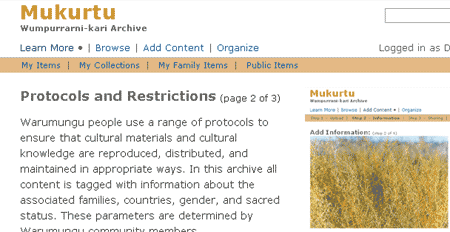How can archives support tribal sovereignty?
“Archives can support human rights, but have in the past been instruments of human rights abuse and oppressive regimes…”[1]
For many years, archives have been a part of the problem, perpetuating cultural inequalities, inaccurate histories and depriving tribes of their cultural heritage, but with the move toward increasing tribal sovereignty, archives can play a vital role in restoring and preserving tribal autonomy. “Recognition and implementation of the right of indigenous communities and individuals to determine third-party access to records held by archival organizations could redress past discrimination.” [2]

Archives provide the opportunity for modern American Indians to have access to their history and traditional culture. “The intersection of modern and historic identity is a critical issue for contemporary Native American people,”[3] making the preservation and restoration of traditional culture and histories vital to the development of a modern tribal identity.
Tribal archives have been instrumental in the process of repatriation. “This process of repatriation should include both the intangible and tangible aspects of our existence which combine within a holistic structure to guide our collective futures.”[4] While literal repatriation is only one aspect of tribal sovereignty, it is often used as a metaphor for the process of regaining autonomy and reclaiming culture.
Tribal archives are sources of knowledge and information about identity, culture, language. They serve to maintain memories. They offer an opportunity for native peoples to reclaim authority and command of their own stories, to regain sovereignty over their own history and culture, to restore and retell stories overlooked in the majority of American culture. “It is up to Indian nations to reclaim their histories and traditions, and counter the pervasive influence of American history, which continues to define both Native American history and tradition and tribal jurisdictional authority.”[5] The ongoing struggle of tribes to reclaim their histories is one in which tribal archives must play an important role, returning to the tribes, “the right to revitalize, use, develop and pass on to future generations [their] ways of being and knowing.”[6]
The struggle for sovereignty is larger than a political struggle. “The battle to protect and defend tribal cultures from the multitude of forces that threaten the cultural survival of Indian nations.”[7] As political sovereignty has grown in recent years, the need to expand the definition into realms of cultural and intellectual sovereignty has grown as well.

It is important to consider not only political sovereignty but cultural and intellectual sovereignty,[8] to re-imagine sovereignty, not simply for the purpose of maintaining culture “but to analyze culture as a living context and foundation for the exercise of group autonomy and the survival of Indian nations.”[9] Tribal archives are valuable institutions for recovering and preserving cultural sovereignty. “Cultural sovereignty seeks to provide a different context for political sovereignty, one rooted in autonomy for Native people as distinct cultural groups.“[10] The goal then is not simply to gain legal and political autonomy but to preserve and develop tribal culture, maintaining the memory of the past and history, and revitalizing and passing-on traditions to a new generation of tribal members.
“The most significant challenge of our generation is to safeguard what little remains.”[11] It is our responsibility as librarians and archivists to assist in this endeavor to preserve tribal cultural heritage and traditions.
[1] McKemmish, S., Lacovino, L., Ketelaar, E., Castan, M., and Russell, L. Resetting relationships: Archives and indigenous human rights in Australia, (2011). Archives and Manuscripts, 39 (1): 113
[2] McKemmish, 122
[3] Coffey, W., and Tsosie, R. Rethinking the Tribal sovereignty doctrine: Cultural soverignty and the collective future of Indian nations. (2001). Stanford Law and Policy Review, 12, 206.
[4] Coffey, 202-203
[5] Coffey, 201
[6] McKemmish, 120
[7] Coffey, 196
[8] A drum speaks: A partnership to create a digital archive based on traditional Ojibwe systems of knowledge. Powell, T. (2007). RBM 8.2, 167-179.
[9] Coffey, 191
[10] Coffey, 201
[11]Coffey, 210
